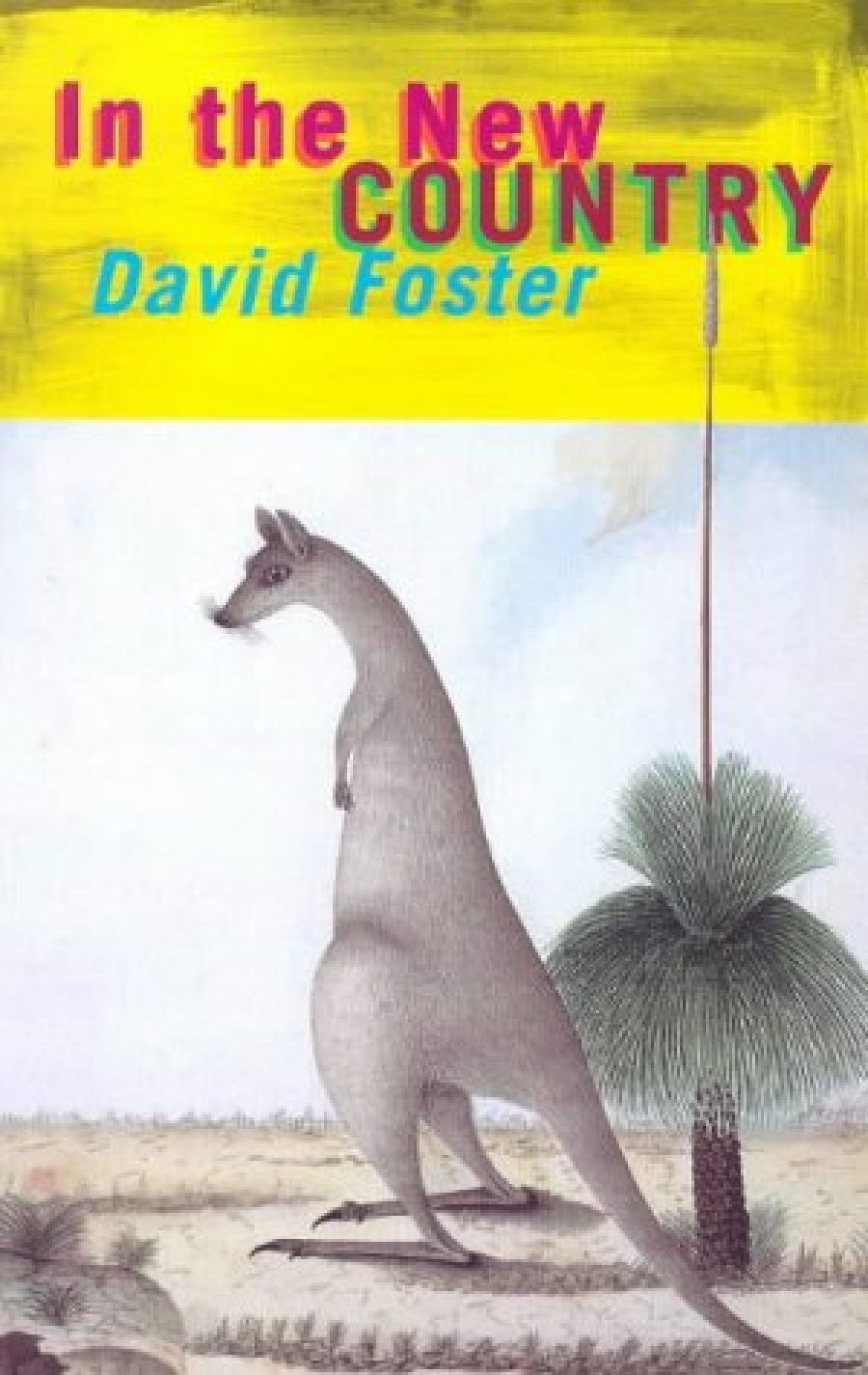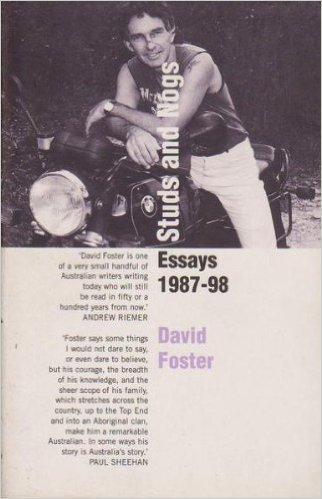
- Free Article: No
- Contents Category: Australian Fiction
- Review Article: Yes
- Article Title: Foster's satire
- Online Only: No
- Custom Highlight Text:
At the end of The Glade Within the Grove, D’Arcy D’Oliveres coughs his way towards death from lung cancer. With him dies David Foster’s benign alter ego, the narrator of his comic Dog Rock novels. Of course, the ‘Arcy who narrated The Glade had become less sociable and considerably more learned than the postman of Dog Rock, but it seemed reasonable to assume that his demise marked the end of Foster’s fictions in the comic mode. Not so. In his latest novel he mixes a good-humoured third person narration with the kind of colloquial dialogues which dominated the MacAnaspie sections of The Glade. In the New Country gives us a funny, more accessible, and more conventional Foster.
- Book 1 Title: In the New Country
- Book 1 Biblio: Fourth Estate $24.95 pb, 213 pp
- Book 2 Title: Studs and Nogs
- Book 2 Subtitle: Essays and polemics 1987-98
- Book 2 Biblio: Vintage, $17.95, 223 pp
- Book 2 Cover Small (400 x 600):

The novel moves us west of the Hume Highway, to the country between Bathurst and Boorowa, settled largely by Irish Catholics in the last century. Crooked Corner, Knocklofty, and Ballymeaner are western slope towns, grazing country affected by the growth of the wool stockpile, the Asian downturn, and the closure of the local abattoirs. They’re dead towns inhabited by the unemployed and the very old. But they still have the heritage of better times in their magnificent Catholic churches and convents. The shire of Yarrawongamullee also has an energetic deputy mayor, Adam Hock, whose plans for tourism include rebuilding the Fane of St Fiacre at Crooked Corner with a view to the Japanese wedding industry. He’s also hoping to entice back the internationally famed Boy from Oz, Dud Leahey, composer of the hit, ‘I still calls Knocklofry Home’. This novel is published by Fourth Estate (London), so Foster has to advise readers to pronounce Leahey in the Australian manner.
The voices of the nonagenarian brothers, Pat and Joe MacPeatrick, with Shorn MacEwe, World Wide Webb, and Billy Minogue – all of them members of their local bushfire brigades – carry the jokes about land rights, celibacy, Catholicism, Rupert Murdoch, and tourism. A pair of Irish brothers make the connection with the Irish homeland, and Foster is away with City-to-Surf runners in gorilla suits and people sneaking around sheep pens – there’s even a miracle. Ad Hock keeps the whole thing moving with his imaginative plans for the St Pat’s old boys reunion. He delivers deadpan many of Foster’s joke lines: ‘Bob Hughes spends one month a year in Australia. Bob Hughes, Art critic for Time? Bob’s a Living National Treasure. By Christ, we’re a lucky country to have a hundred of ‘em, ay. I dare say Indonesia, for all that population, would only have ten or twenty.’
In the New Country, though, is not completely free of uncomfortable propositions. The MacEwes discover they have Aboriginal ancestry and turn into long-grassers, burning around in Shorn’s HR and calling for their land rights. The novel is dedicated to Foster’s three ‘part-aboriginal grandsons … in the hope that Australians may learn to see them, so that they be permitted to see themselves, as Australians, rather than as aboriginal Australians’. It is a sentiment he expressed in a short piece published in the Sydney Morning Herald at the height of the Stolen Generation debate, and reprinted in Studs and Nogs, Vintage’s collection of his essays. Here, Foster takes a fairly uncontroversial position, in that he wants to redress the balance for people of mixed descent so that they can acknowledge their white as well as their black heritage. But, as usual, he goes too far: ‘a white woman has very little influence over a tribal black, while a black woman who mates with a white man does so in order to confer on her children the advantage, as she sees it, of a white father and a white upbringing.’
Even out of context, this seems breathtakingly insensitive and ignorant of the multitude of situations in which such mating has occurred in the past. Ronald Wilson wrote a hurt and shocked reply to the newspaper, and people of goodwill wondered where Foster had been during the debate.
Over a whole book of essays, this tendency to throw away his argument emerges as a habit. One of the first essays in the collection, ‘On Literature and Martial Art’, demonstrates Foster’s magnificent command of rhetorical structure. It’s a rhythmically balanced, learned exposition of an interesting subject. But he can’t resist the indulgence of the aside that undermines his argument and alienates his audience. When he delivered this paper at the Australian Defence Force Academy, it was clear that he thought his views on women in the bushfire brigade offered a defiance of current feminism. Yet, this is precisely the point where his essay loses its high argument and collapses into personal prejudice – Foster projects whatever troubles he has with his wife and the women in the local fire brigade onto the universal relationships between men and women. Comic material intrudes into a fascinating discourse on martial codes. (In the New Country recognises these comic possibilities with a new twist on Furphy’s Nosey Alf.)
His recounting of the argument between Leavis and Snow on the relationship between literature and science provides the kind of wide-ranging intellectual speculation that demonstrates in its very style a freedom from the barriers of ‘discipline’. But he can’t resist a passing swipe at David Malouf’s novels: ‘a piece of trash like Remembering Babylon, which rates, as a document on a par with Marlo Morgan’s Mutant Message, arouses in me the repugnance that C.P. Snow aroused in F.R. Leavis.’
It’s not wise; it’s not well-judged; and it no doubt ensures that some of Foster’s readers will write him off.
Foster acknowledges his own curious persona in an essay on satire where he describes a satirist as ‘an angry response looking for something to respond to’, and one who ‘observed and laments his own destructive impulses’. Foster can’t keep this persona out of his writing, even at the expense of his own interests. The intrusion of the satirist gives these essays something of the status of fiction. The voice here does not claim to be objective, and may throw away its authority at any minute. What Foster gives us is his love of language and ideas; here, as in his novels, he allows the language and the ideas to lead him astray. If a digression presents itself, he takes the opportunity to follow it. This is not a fictional narrator – it’s David Foster, the novelist who lives at Bundanoon – and many people have witnessed him delivering these pieces to conferences or literary festivals. Yet David Foster is more than himself, in that he’s inhabited by the demons of satire. Foster’s persona and his writing challenge those comfortable divisions between fiction and non-fiction.
Among these essays lie several pieces where the voice is utterly controlled and sustained. His marvellous piece on ‘Classics and Canon’ cuts straight through all the laboured academic debate with a fresh and straightforward approach: a classic is not necessarily estimable, it just won’t go away. This, however, is merely a pale record of the paper’s delivery to the ASAL conference in 1996 when Foster recited one of Juvenal’s satires from memory. Literary people often seem in awe of Foster’s scientific education, but his real importance to contemporary intellectual discussion in Australia is that he’s an autodidact, in the great tradition of Australian autodidacts. This means that his speculations are unfettered by reference to the required reading or conventional limits to a subject. We need writers like this to shake up our complacency, but so many of them tell us only what we already think.
The essays show other aspects of Foster’s personality. When he writes about the Northern Territory, as in the pieces about Aboriginal payback, barramundi or prawn fishing, he loses himself in his interest in the people and subject he’s recording. His delightful piece on his namesake, the champion axeman, sympathises completely with another obscure Australian with claims to glory. When he writes about his experiences during the bushfire season of last year, Foster reveals himself as a suffering, utterly human, comrade. It is annoying, though, that Vintage have not dated all of these pieces, nor indicated their place of first publication. In some cases, context makes all the difference to our understanding.
In Foster, we have a writer at the height of his powers in all his various manifestations. Readers who enjoyed The Glade and want to follow an idiosyncratic mind as it speculates about the world – no matter how disturbing, anxiety-producing, or downright wrong those speculations may be – will be exhilarated by Studs and Nogs. Those who prefer character and comedy can settle back to laugh through In The New Country.


Comments powered by CComment